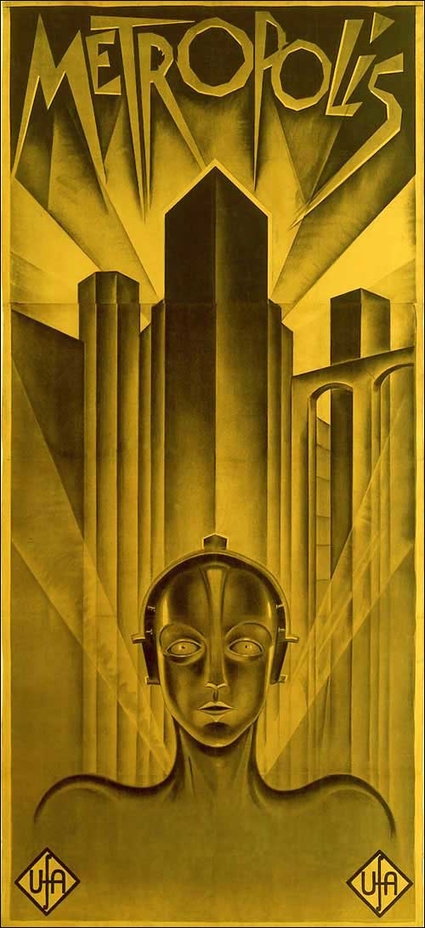The future. Metropolis is a wonderful city, high above the ground its towers stand. The people prosper, the economy is flourishing, the suspended streets are busy. But Metropolis also has a great secret, so hidden that not even Freder Fredersen, son of founder Joh Fredersen knows about it. He is spending his free time in the Eternal Gardens, when suddenly a woman shows up, with what looks like a class of children. They're from the City of Workers, in the depth, Freder learns. "These are your brothers", she tells the children, before she is forced to leave. Freder is so intrigued he follows them into the depth and doesn't like what he sees. The workers are exploited, they must do labor like robots. Freder tries to convince his father to change, while the woman tries to keep workers' morale high by predicting a man will stand up that will mediate. Someone that will use both hands and head, someone that will be the heart.
Metropolis features special effects and set designs that still impress modern audiences with their visual impact – the film contains cinematic and thematic links to German Expressionism, though the architecture as portrayed in the film appears based on contemporary Modernism and Art Deco. The latter, a brand-new style in Europe at the time, had not reached mass production yet and was considered an emblem of the bourgeois class, and similarly associated with the ruling class in the film.
Rotwang's Art Deco laboratory with its lights and industrial machinery is a forerunner of the Streamline Moderne style, highly influential on the look of Frankenstein-style laboratories of "mad scientists" in pop culture. When applied to science fiction, this style is sometimes called Raygun Gothic.
Metropolis was cut substantially after its German premiere, and much footage was lost over the passage of successive decades. There have been several efforts to restore it, as well as discoveries of previously lost footage. A 2001 reconstruction of Metropolis, shown at the Berlin Film Festival, was inscribed on UNESCO’s Memory of the World Register in that same year. In 2008, a copy of the film 30 minutes longer than any other known surviving copy was located in Argentina. After a long period of restoration in Germany, the restored film was shown publicly for the first time simultaneously at Berlin and Frankfurt on February 12, 2010. The event of the Friedrichstadtpalast was shown live on a screen at the Brandenburg Gate as well as on TV on ARTE. This version was also shown in New York at the Ziegfeld Theater in the last two weeks of October 2010.
Cast:
- Alfred Abel: Joh Fredersen, the leader of the city.
- Gustav Fröhlich: Freder, Fredersen's son who tries to mediate between the elite and the workers.
- Brigitte Helm: Maria, as both the pure-at-heart teacher and the machine-version of her.
- Rudolf Klein-Rogge: C. A. Rotwang, a mad scientist.
- Heinrich George: Grot, Foreman of the Heart Machine.
